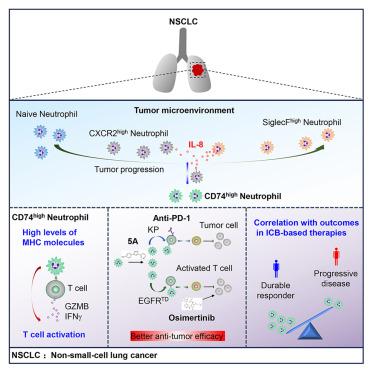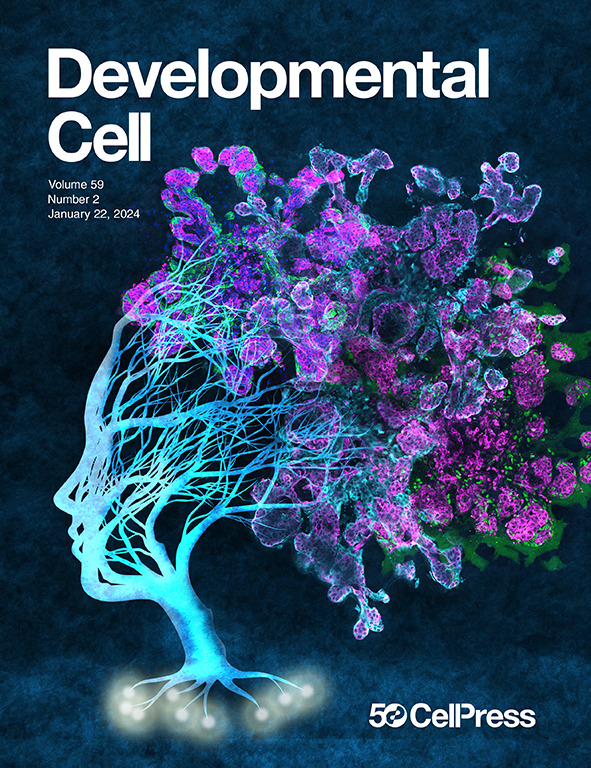中性粒细胞亚群可激活抗肿瘤免疫力并抑制非小细胞肺癌的进展
IF 10.7
1区 生物学
Q1 CELL BIOLOGY
引用次数: 0
摘要
肿瘤微环境(TME)中的中性粒细胞是与癌症预后和免疫疗法相关的异质性种群。然而,非小细胞肺癌(NSCLC)肿瘤微环境中异质性中性粒细胞的可塑性和功能仍不清楚。在这里,我们发现中性粒细胞会产生高水平的白细胞介素(IL)-8,从而诱导 CD74highSiglecFlow 中性粒细胞的分化,并抑制 IL-8 人源化 NSCLC 小鼠 TME 中 CD74lowSiglecFhigh 中性粒细胞的生成。CD74highSiglecFlow中性粒细胞通过抗原交叉呈递增强了抗肿瘤T细胞反应。在IL-8人源化的中性粒细胞中删除CD74会损害T细胞的活化并加剧NSCLC的进展,而CD74激动剂能增强T细胞的活化和抗程序性细胞死亡1(PD-1)或奥西莫替尼疗法的疗效。此外,晚期NSCLC患者TME和外周血中CD74高CD63低的中性粒细胞表征了NSCLC小鼠TME中CD74高SiglecFlow的中性粒细胞,并与抗PD-1加化疗的反应性密切相关。这些发现证明了IL-8-CD74高中性粒细胞轴可促进NSCLC的抗肿瘤免疫。本文章由计算机程序翻译,如有差异,请以英文原文为准。

A subset of neutrophils activates anti-tumor immunity and inhibits non-small-cell lung cancer progression
Neutrophils in the tumor microenvironment (TME) are heterogeneous populations associated with cancer prognosis and immunotherapy. However, the plasticity and function of heterogeneous neutrophils in the TME of non-small-cell lung cancer (NSCLC) remain unclear. Here, we show that neutrophils produce high levels of interleukin (IL)-8, which induce the differentiation of CD74highSiglecFlow neutrophils and suppress the generation of CD74lowSiglecFhigh neutrophils in the TME of IL-8-humanized NSCLC mice. The CD74highSiglecFlow neutrophils boost anti-tumor T cell responses via antigen cross-presentation. Deleting CD74 in IL-8-humanized neutrophils impairs T cell activation and exacerbates NSCLC progression, whereas a CD74 agonist enhances T cell activation and the efficacy of anti-programmed cell death 1 (PD-1) or osimertinib therapies. Additionally, the CD74highCD63low neutrophils in the TME and peripheral blood of advanced NSCLC patients phenocopy the CD74highSiglecFlow neutrophils in the TME of NSCLC mice and correlate well with the responsiveness to anti-PD-1 plus chemotherapies. These findings demonstrate an IL-8-CD74high neutrophil axis that promotes anti-tumor immunity in NSCLC.
求助全文
通过发布文献求助,成功后即可免费获取论文全文。
去求助
来源期刊

Developmental cell
生物-发育生物学
CiteScore
18.90
自引率
1.70%
发文量
203
审稿时长
3-6 weeks
期刊介绍:
Developmental Cell, established in 2001, is a comprehensive journal that explores a wide range of topics in cell and developmental biology. Our publication encompasses work across various disciplines within biology, with a particular emphasis on investigating the intersections between cell biology, developmental biology, and other related fields. Our primary objective is to present research conducted through a cell biological perspective, addressing the essential mechanisms governing cell function, cellular interactions, and responses to the environment. Moreover, we focus on understanding the collective behavior of cells, culminating in the formation of tissues, organs, and whole organisms, while also investigating the consequences of any malfunctions in these intricate processes.
 求助内容:
求助内容: 应助结果提醒方式:
应助结果提醒方式:


